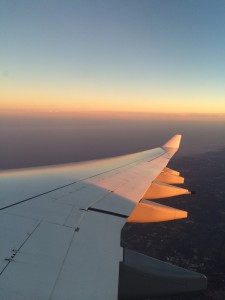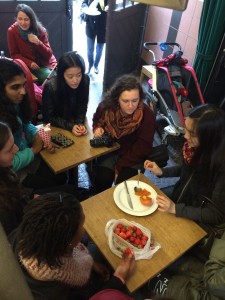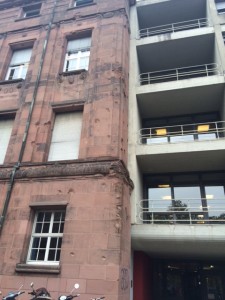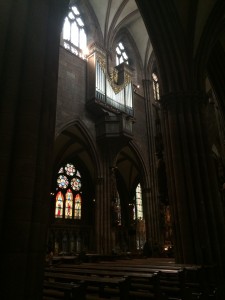The flight to Frankfurt is short, compared to other international jaunts, but add in a two-hour train trip and we have been traveling for a long time. Jiji Plecha, ’18 had felt that “the materials in class have been really clearly related to what we’re going to talk about here on the ground,” but nowhere was that more clear than when she found a personal screen at every airplane seat. “The Philosophy course has been focused on how technology is so deeply integrated into our lives, and when we got on the plane, there were monitors in everyone’s faces.” Of course, some of us spent time looking out the windows anyway.
Though the group did some “getting to know you” exercises before departure, Jiji has been struck by “how much the social groups within the cluster have loosened,” giving everyone a new sense of closeness. She notes that this overlapping is happening in their academic perspectives as well, as they learn from each other’s diverse disciplinary backgrounds.
After arriving in Freiburg, and leaving our luggage at the hotel, we traipsed around the city, led by Professor Bob Dostal (Philosophy), whose research has regularly brought him to the University of Freiburg throughout his career. Jiji notes that the city is different than others she’s encountered in Europe, “because there was so much fighting for influence and jurisdiction, there isn’t a consistent feeling across the city. You can see that particularly in the architecture. Some of the buildings look like they could be in France, which of course, they could be, since we’re so close to the border. The living history of still-bullet-riddled buildings is also striking.”
When we visited the Munster (the medieval cathedral in the center square), “it was interesting to hear about the way the communities came together to take care of the art during the war – taking the stained glass out of the cathedral to preserve it.”
Our evening ended with a group dinner at a traditional German restaurant in the main square – students tried spatzle, as well as a local twist on the classic noodle and a variety of game (wild boar, venison, veal). The winner of the evening, though, may have been the pumpkin soup. Before turning in, Jiji and I chatted about what she’s most looking forward to this trip. As it turns out, she spent part of her junior year of high school researching and writing about biogas digesters, so our visit to a biogas plant next week will be an exciting opportunity to see the concept in person.
Tomorrow, we hike a hill and meet our institutional hosts, the Innovation Academy. Here’s to a full night’s sleep and a good German breakfast!
About our guest commentator:
Jiji Plecha is a sophomore at Bryn Mawr College. She was drawn to this 360 after her ESEM (titled Environmental Social Problems, taught by Sociology professor Nate Wright) helped her to understand how closely the scientific study of environmental issues is related to the sociological and political perspectives. She’s also been long drawn to Philosophy, and enjoyed a previous class with Bob Dostal. When not vascillating between a major in Sociology or Philosophy, she can be found working as a theater technician and stage manager.




